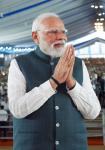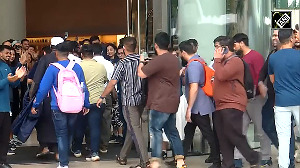It is extremely surprising that the Japanese ambassador's suggestion of a Japan-China-India axis has not received more attention in India.
Two days after Yasukoni Enoki proposed this trilateral axis, the Chinese defence minister, Cao Gangchuan, who is also vice-chairman of the powerful Central Military Commission headed by former president Jiang Zemin, was in New Delhi for talks with George Fernandes.
Describing the proposal as "important for Asia's stability and prosperity", Enoki said it "had been discussed informally with the Indian side and will help India correct its positioning in Japan's diplomacy."
Apparently, senior Indian and Japanese foreign office officials talked it over earlier this year. Though the proposal had not been mentioned to China at the time of Enoki's announcement, it is bound to have cropped up during Cao's tour of Indian military establishments.
There are two aspects of this idea, both equally significant for India and Asia. The first concerns bilateral Indo-Japanese relations. The second concerns the prospect of developing an Asian security framework on the lines of the Conference on Security and Cooperation in Europe or even, perhaps, the North Atlantic Treaty Organisation.
I would also think that Japan's suggestion presents the ASEAN Regional Forum, with which Japan, China and India are already associated, with the opportunity to demonstrate some diplomatic initiative.
At the bilateral level, Japan was one of India's most enthusiastic supporters immediately after independence. Every Japanese ambassador visited New Delhi immediately after taking over for the first few years. Japan was the biggest buyer of Indian coal. India also received the most development aid from Japan.
Gradually, however, all that petered out. The Japanese were disappointed in India's economic policies and progress. They stopped buying Indian coal and bought coal mines in Australia instead. Prime ministerial visits became fewer and fewer, the gaps in between longer and longer. There was once a 21-year period when no Japanese prime minister came to India.
Now, as Enoki says, his proposal "will help India correct its positioning in Japan's diplomacy." It is a recognition of India's economic progress which, in turn, is reflected in political and military terms. The Japanese were never taken in by the illusion of global importance created by non-aligned posturing. For them there can be diplomacy except from a position of strength.
Internationally, this is an attempt to counter-balance America's global hegemony. It's not the first of course. Five years ago the Russians mooted a "strategic triangle" between Russia, China and India.
Though lukewarm at the time, the Chinese seemed slightly more receptive in 2001 when former National People's Congress chairman Li Peng visited India. But the formulation really only sought to revive the Cold War polarisation with Asian backing for Russia.
Enoki's far more realistic initiative, made while announcing a $57 million loan for India, implies that Junichiro Koizumi has reservations about the unipolar worldview of George W Bush's Neo-Conservative advisers.
So far, Japan has been coy about diplomatic involvement in Asia, refusing to accept the political obligations of being the world's second largest economy. It has now taken the plunge at a time when despite ostentatious signs of Indo-American solidarity (like US troops practising jungle warfare in northeastern India), Atal Bihari Vajpayee seems to be somewhat anxious to underline his government's independence in global affairs.
Bush's decision to bestow the accolade of "Major Non-Nato Ally" on Pervez Musharraf may rankle but should not be a real factor in Indo-US relations. The title will make no difference to already close US-Pakistan cooperation in rooting out Taliban and al Qaeda fighters.
In fact, this mark of American approval should be more worrying for Musharraf than India. But it is curious that Colin Powell did not breathe a word of this formal benediction when he was in New Delhi.
This reticence is to be contrasted with India's candour in keeping the US posted of all dealings with Iran and warn that no alliance can survive without mutual confidence. India needs the US to restrain Musharraf over succouring Kashmir terrorists. Vajpayee famously calls India and the US "natural allies" and Bush says they are "strategic partners." But, obviously, the relationship has its limits.
There are plenty of points of disagreement. India refused to send troops to Iraq, did not support Robert Zoellick at Cancun or endorse the US agenda at the World Trade Organisation. It refuses to yield on outsourcing. Vajpayee also rejects American invitations to gang up on China at the United Nations Human Rights Commission in Geneva.
Of course, India has its problems with China. But visits and talks in recent years have resulted in a bilateral dispute-resolution mechanism, and Vajpayee and Fernandes established excellent rapport with their hosts when they visited China last year. Cao says the two Asian giants are becoming "eternal good neighbours, good partners and good friends."
India has no intention of being dragooned into any exercise to contain China's growing might. Nor does it seek to rival Chinese influence in the Asia-Pacific region. But it does see itself as a major player in a multipolar world. That view conflicts with the strategy of determined unilateralism, first enunciated in a 1992 Defence Planning Guidance document under Bush's father, which bluntly warns even allies not to consider competing with America's political or military leadership.
Like India, China also chafes against the notion of the world being forced into a US-made straitjacket. But it is Japan's support, howsoever discreetly expressed, that could really translate a knee-jerk Asian reaction into strategic reality and a viable Asian security system.



